Kevin Clarke
Operetta Research Center
28 January, 2017
An interview with Felicitas Wetzel, a German sound artist who created a concert performance with Offenbach music and quotes called Deine Operette – Ein Portrait in mehreren Stimmen (“Your Operetta – A Portrait in Several Voices”). It is a live radio play for eight narrators, cello and sound. We asked Miss Wetzel about this project, and why she chose Offenbach and his opéra bouffe Ba-Ta-Clan as the center of her “portrait.”
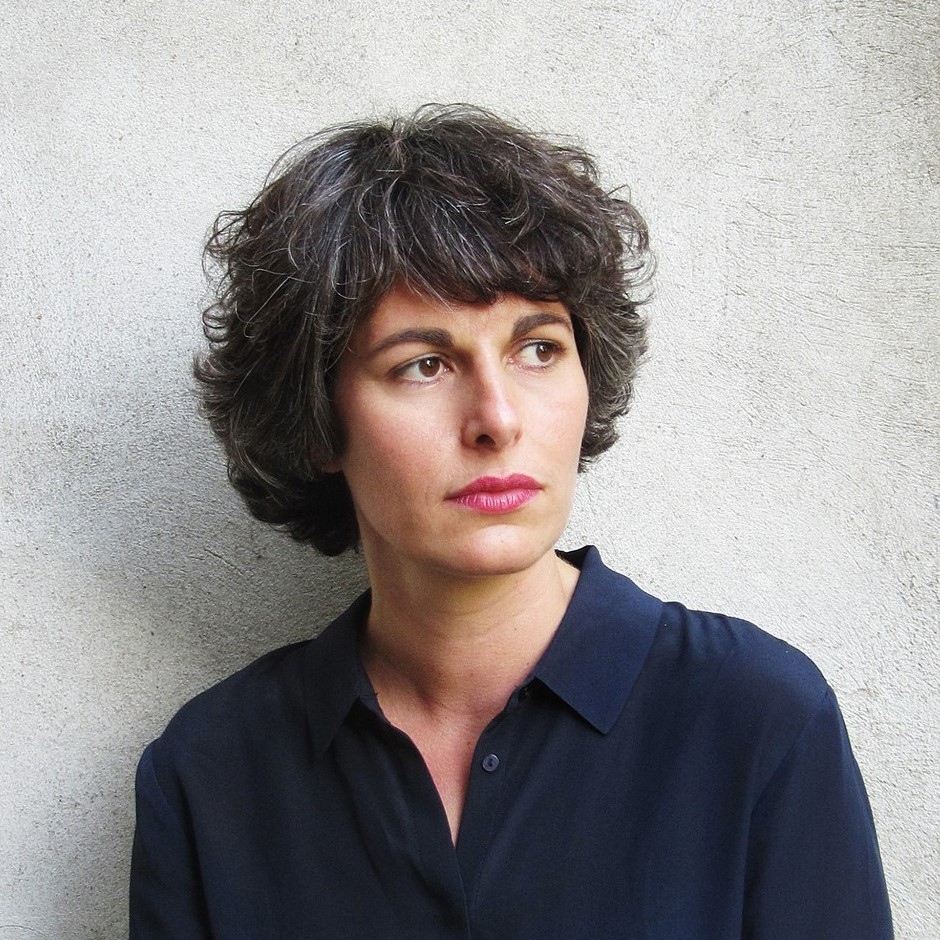
Performance artist Felicitas Wetzel. (Photo: Kristina Moser)
What are the texts you chose, and what kind of operetta do you explore in Deine Operette?
I asked myself why operetta is not as popular today as it used to be. What forces shaped operetta and how did it come about? To answer these questions, I returned to the origin of the genre and analysed one of Jacques Offenbach’s first operettas, the one-act Ba-Ta-Clan. Operetta is a complex phenomenon. It is determined by social, economic, and political factors. Content and form of operetta are directly related to the place and time of its development. Operetta was thoroughly contemporary. However, many references are no longer widely known today, and the taste of music has also changed. In other words, operetta nowadays isn’t quite accessible – which makes it all the more exciting to explore it in greater detail.
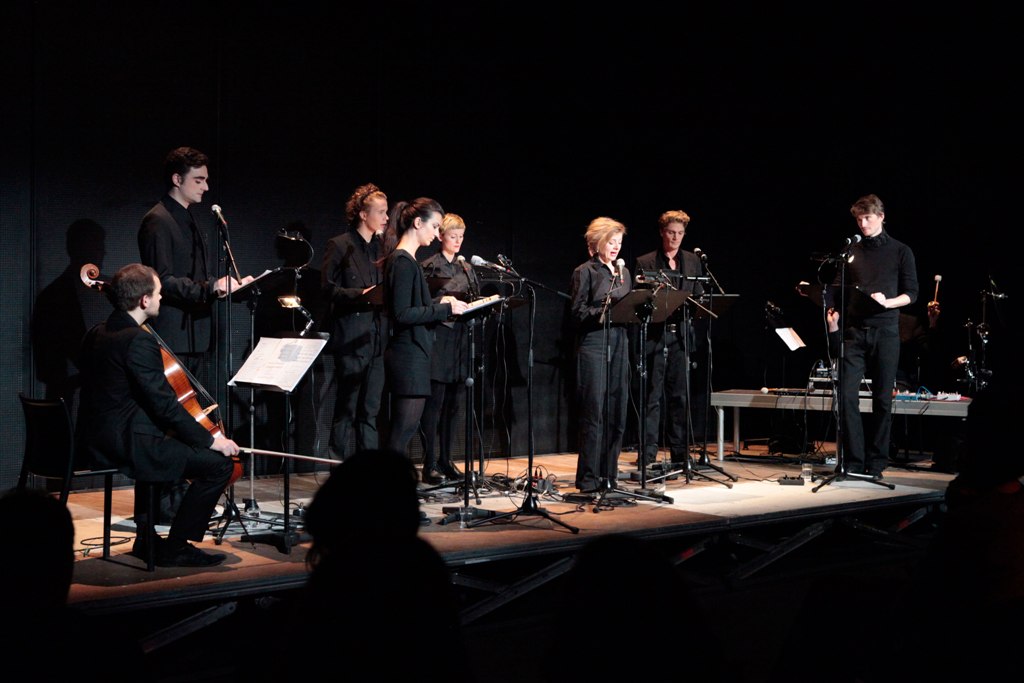
The cast of “Deine Operette” in Karlsruhe. (Photo: Hannah Cooke)
To show the complexity of operetta, I wrote a play for eight narrators. Each of them focuses on the genre and the time from a different perspective. They describe the crackling atmosphere in Offenbach’s notorious Théâtre des Bouffes-Parisiens, the rumbling machines in the halls of the World’s Fair, and the monumental urban reconstruction of Paris. My references are Jacques Offenbach und das Paris seiner Zeit by Siegfried Kracauer and Nana by Emile Zola, the biography Offenbach – Facetten zu Leben und Werk by Peter Hawig and the non-fiction book Die Neuerschaffung von Paris by David Jordan. I am also alluding to Jacques Offenbach’s essay about the opéra comique, extracts from the libretto of Ba-Ta-Clan by Ludovic Halévy, quotations by German Chancellor Angela Merkel, lines from the pop song Call Me Maybe by Carly Rae Japsen and fragments of skits by comedians such as Loriot or Dodokay.
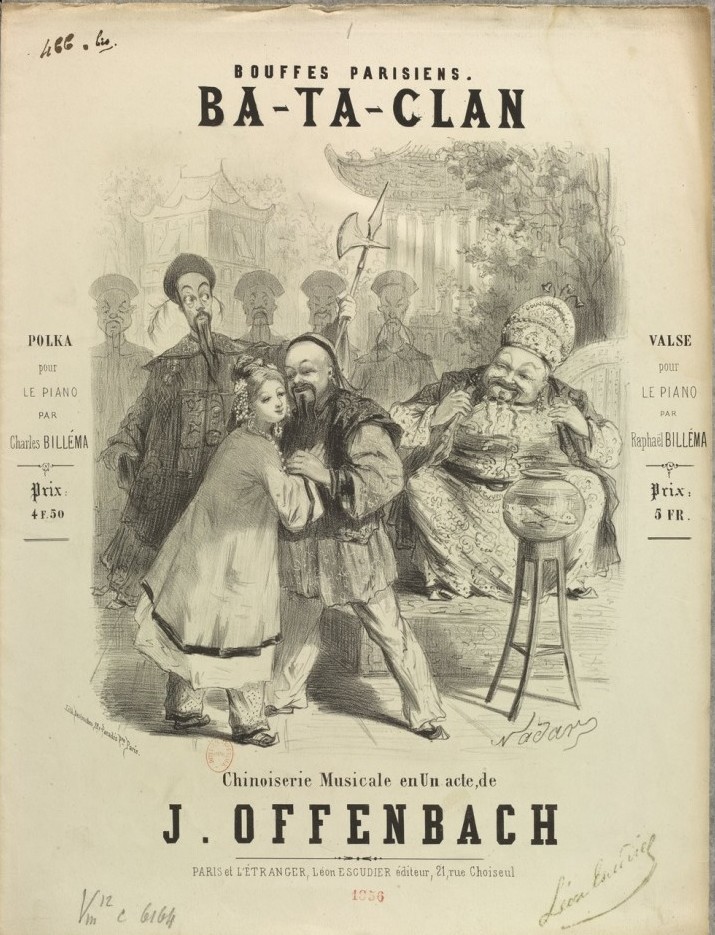
Sheet music cover for Offenbach’s “Ba-Ta-Clan.”
You focus on Paris in the 1850s and 60s. Why did you exclude various later operetta developments? (How is Offenbach different from these later trends?)
I am interested in the time when something new arises. In 1855 Jacques Offenbach opens the Théâtre des Bouffes-Parisiens on the occasion of the World’s Fair in Paris. The World’s Fair in Paris is the second World’s Fair, after the Great Exhibititon in London (1851). It demonstrates industrial progress. In the middle of the 19th century, France was convulsed by fundamental economic, political, and social change. Money was being redistributed, the old nobility was losing influence, the bourgeoisie was gaining strength, new economic and political classes were emerging. Emperor Napoleon III governed the Second Empire, but democracy was on the rise. All of Paris was under construction, the medieval structure was being torn down to modernize the city. The urban restructuring brought countless jobs, but the gap between rich and poor increased as well. Jacques Offenbach composed “Bouffonnerien” (comical plays), working within the tradition of the comic opera, the arts of the fairground, and the “Comédie en vaudevilles“.
After his plays were repeatedly rejected by the famous Opera-Comique, he eventually opened his own Théâtre des Bouffes-Parisiens and invented the art form operetta.
As I said, it was a time when a lot of things were happening, which are reflected in his operettas. Offenbach in particular fascinates me because of his incisive observatory skills and his striking sense of humour. His plays for the most part work on a meta-level, meaning they are set in or clearly refer to his own time and thus implicitly criticize the contemporary system. But in the foreground there are rousing melodies and entertainment. Offenbach’s operettas are clever, light-hearted, and easily digestible.
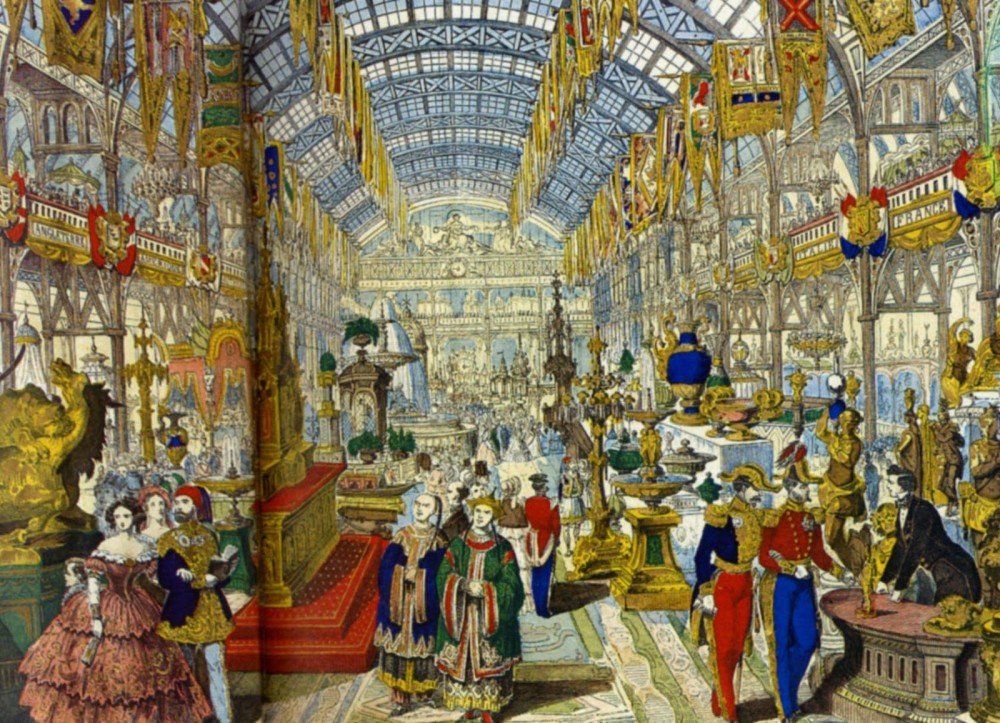
The World Fair in Paris in 1855.
Besides the text collage, there are cello, sound, the setting, costume, and light. Which role do these elements play and why did you create a live piece?
I wanted to recreate a certain atmosphere and revive the glittering character of operetta. The audience in my play is transposed back into Offenbach’s Théâtre des Bouffes-Parisiens. I focus on acoustic narration, which conjures up images through listening. Moreover, through the simultaneous presence of audience and actors in the same room, a special atmosphere is being created. For this reason I decided to write a live radio play, thus reducing the visual elements as far as possible. I use material that is familiar from theatre and therefore hovers in the back of people’s minds: pedestals, music stands, spotlights, black concert clothing, and the like. The set is classic theatre with a stage and grandstand. The room is immersed in subtle lighting, the lights are hanging low over the stage and the audience, recreating the atmosphere of the narrow Bouffes-Parisien. The performers wear black clothing, typical of the musicians in an orchestra. Their wardrobe is complemented by glittery detail that points to the past glamour of operetta.

Charicature of Offenbach’s theater, the Bouffess Parisienes.
The music of the live radio play Deine Operette is a re-composition of themes from Offenbach’s Ba-Ta-Clan, interpreted by a cello, speaking choir, and sound. Offenbach’s fragments are interwoven with the contemporary pop song Call Me Maybe, field recordings from Paris, the rhythm of electronic rave music, and electronic effects. Acoustically, the hustle and bustle in the Bouffes-Parisiens, on the boulevards of Paris, and on the mini-island Ché-i-no-or (the venue of Ba-Ta-Clan) are being evoked. Furthermore, the sound also tells the story of music. Offenbach might just sound like this today: melodies that conquer the charts as pop songs, rap that indicts social and political injustice, rousing dance rhythms put up in clubs, and field recordings that move to distant places.
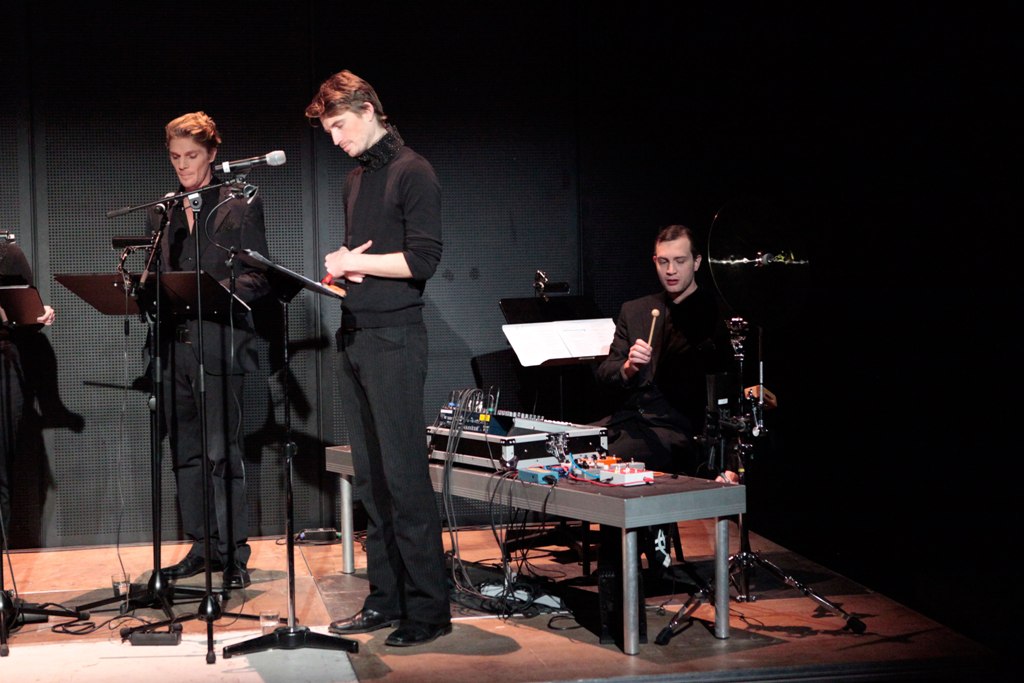
The world-premiere performance of “Deine Operette.” (Photo: Hannah Cooke)
Is Ba-Ta-Clan a show you particularly love?
It’s the model of many of his later operettas. With this piece, Offenbach opened in 1855 the Théâtre des Bouffes-Parisiens, his own theatre. The piece is extremely humorous and spirited, a wonderful parody of grand opera and empire. Here is a plot summary: Ba-Ta-Clan plays on the mini-island Ché-i-no-or and deals with the ruler Fé-ni-han who doesn’t speak the language of his nation. But he manages quite well, because he knows how to adopt the right attitude, and with the exclamation “Raca” nearly all the state affairs are dealt as if by magic. But then there is a fatal misunderstanding when some state dignitaries are presented to Fé-ni-han. He is supposed to decorate them, but instead he impales them. Even though he did wonder “How do you say: when in doubt, always impale?” unfortunately this time he is wrong. The rage of his people is awakened, and he makes every effort to get rid of the uncomfortable throne as quickly as possible. The sheer content thus promises great fun. Ba-Ta-Clan shows clearly what operetta at that time was all about. Offenbach deals with subjects of his day and age, but he projects them to the distant fantasy island Ché-i-no-or, because it was not allowed to criticize the empire directly. However, Offenbach not only criticizes. Above all, he feels enthusiastic about Paris and all its possibilities: dancing or going out, of which he mentions several examples (Bal Mabille, opera ball). Also Offenbach’s neologisms, which anticipate phonetic poetry typical of Dadaism, are fabulous. For example: “Ri-bi-xi, mi-dis-sis-si, fi-fi-li-ti, grississisi.”
In the play, there are numerous hints and symbols, which can eventually be interpreted by the audience and in the end yield an accurate picture. For example, the name Ko-ko-ri-ko (chief of the guards and leader of the conspirators) refers to the cock, the French heraldic animal and symbol of the French Revolution. It’s also excellent how Offenbach musically parodies grand opera. He even surpasses grand opera’s bad habit of hyping empty words in great melodies. Almost endlessly, Offenbach’s actors sing about a chair. Let me add that Ba-Ta-Clan has only four actors and no chorus, for the national rules for theatre privilege allowed Offenbach only this small cast. Ba-Ta-Clan is a comical, small musical theatre of particular ease and astuteness.

Characters on the seet music cover for Offenbach’s “Ba-Ta-Clan.”
There is a video of the world-premiere performance in Karlsruhe. Who were the actors and musicians you worked with? Who was the audience?
The actors Jan Andreesen, Veronika Bachfischer, Joanna Kitzl, and Lisa Schlegel were part of the ensemble of the state theatre “Badisches Staatstheater Karlsruhe”. Felix zu Knyphausen and Georgios Tzitzikos are free-lance actors. Philipp Falser and Juliane Tenziger were graduates from the University of Music and Performing Arts in Stuttgart. Furthermore, there was the cellist Florian Wetzel, at that time a student at the University of Music in Karlsruhe, and the media artist Martin Buntz, back then a student at the Karlsruhe University of Arts and Design. The overture from Deine Operette had its premiere at the radio play days “ARD Hörspieltage 2014” in Karlsruhe. The premiere of the entire piece was a public performance at the Karlsruhe University of Arts and Design and at the same time, it was my diploma examination. The audience was comprised of festival visitors, members of the university, my professors, family and friends, and interested guests.
What was the reaction from your actors when they explored this “new” form of operetta? What were reaction from the audience?
Even the ensemble was impacted by the joy and the ease of the operetta. The rehearsals were focused but also a lot of fun. We laughed a lot about Offenbach’s inventive neologisms. I think Deine Operette also aroused in the ensemble a new interest in the genre and its complexity. The whole cast worked together extremely professionally and in a lively way, interpreting Deine Operette dynamically and musically. The audience expressed comments such as “impressive,” “irritating,” “overwhelming,” “a work of art,” “all elements harmonizing,” “firing the imagination,” “significant spacing and staging.”
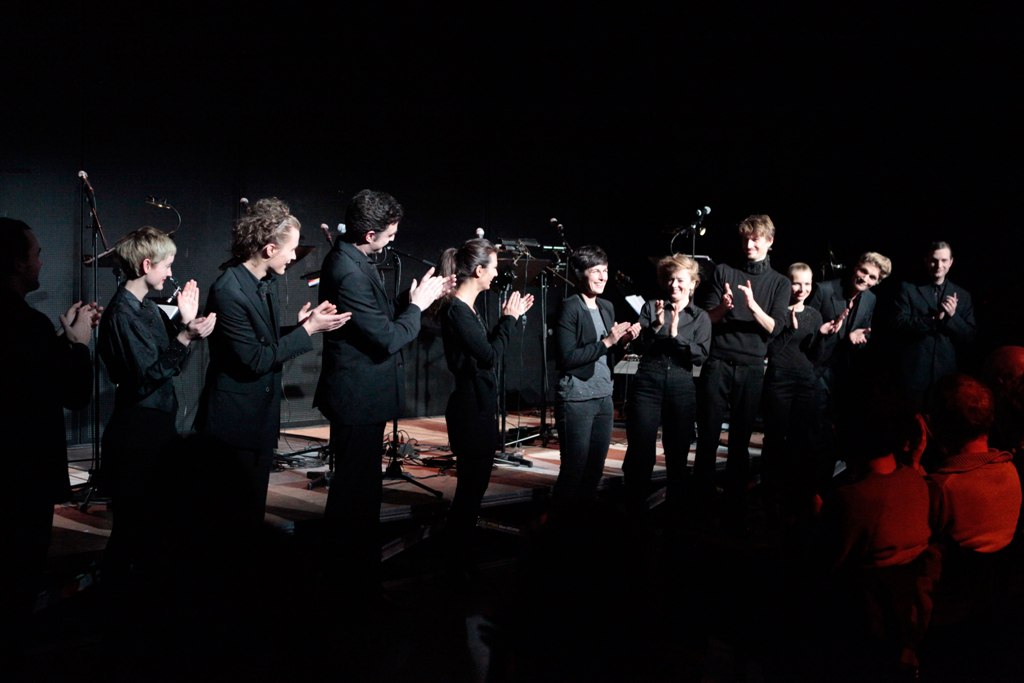
Felicitas Wenzel (middle) surrounded by her “Deine Operette” cast. (Photo: Hannah Cooke)
Will there be more performances anywhere else in the future?
I would love to perform Deine Operette again. At the moment, there are no fixed plans, but I’m searching for places and occasions to perform. Perhaps, there is an opportunity in the Offenbach-Year of 2019.
In my current project, I am researching “Volksmusik” and the ritual of making music. I examine the genre “Volksmusik” and the social and cultural activities related to it. On the one hand, I do practical research, such as attending a yodel course in the Allgäu, on the other hand I read scientific texts. Out of the results will emerge a new artwork.
The project is made possible by a graduate stipend of the state of Baden-Württemberg.
In February 2017, I will work as a sound artist within the project “Inschrift Heimat” by the state theater Badisches Staatstheater Karlsruhe. There, I will process the initial steps of my “Volksmusik” project.
Music always plays a role in my artistic research and practice, but I also deal with everyday topics such as currywurst or bureaucracy. Through these investigations I usually develop performances or radio plays.
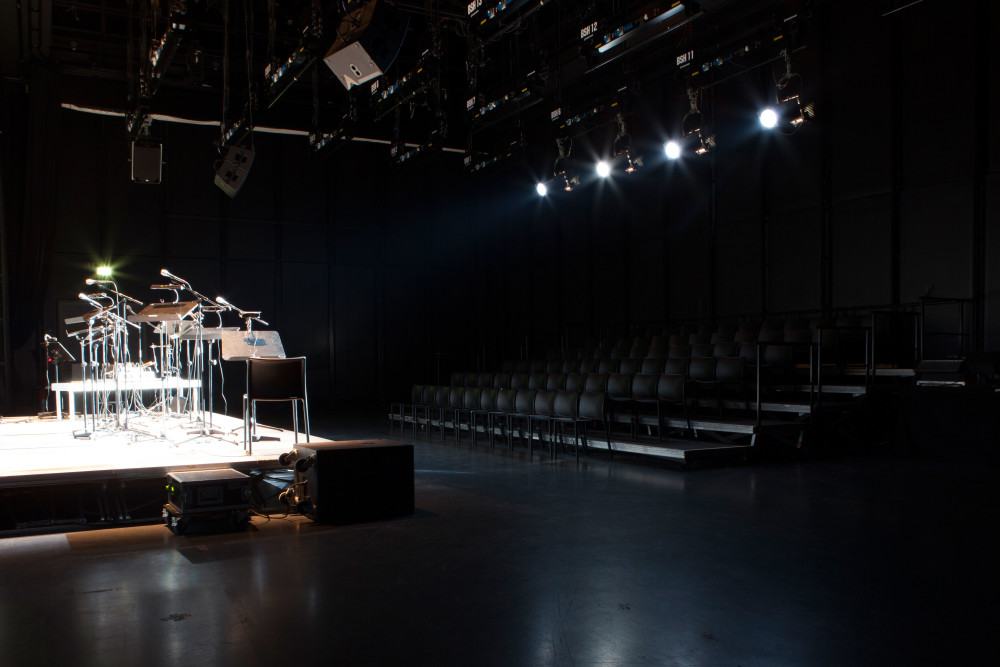
The empty auditorium in Karlsruhe, ready for a new project. (Photo: Hannah Cooke)
Will you tackle any more operetta projects in the future?
For sure! Although at the moment I’m more into “Volksmusik,” operetta is always on my mind. Operetta was not just a mood, it is a real passion. I will hopefully write more pieces. I’m interested in cooperating with artists or musicians, and I’m also tempted to stage a “classical” operetta.
For more information on Felicitas Wetzel, click here.
